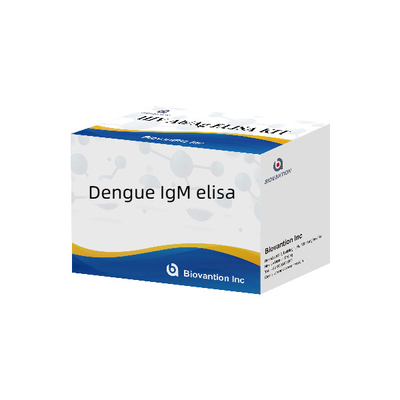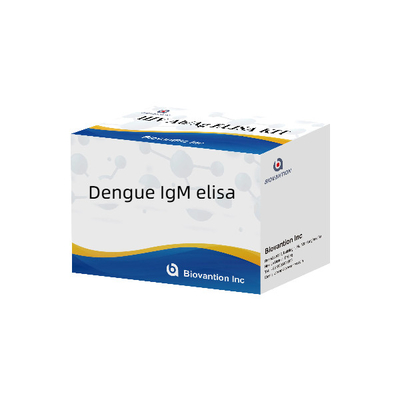Dengue IgM ELISA
INTENDED USE
The Dengue IgM ELISA is a solid-phase enzyme-linked immunosorbent assay for the qualitative detection of anti-
dengue virus (DEN1, 2, 3, 4) IgM in human serum or plasma. It is intended for healthcare professional use only as an
aid in the diagnosis of acute infection with dengue virus.
| Product details |
Description |
| Delivery |
Within 48 hours |
| Packaging Specifications |
8 x 12 strips, 96 wells |
| Country Of Origin |
China |
| Manufacturer |
18 months |
| Preservation method |
2℃-8℃ |
| Specimen |
Whole blood |
| Assification |
class1 |
| Type |
Elisa Test Kit |
PRINCIPLE
The Dengue IgM ELISA is a solid-phase enzyme-linked immunosorbent assay based on the principle of the capture
immunoassay methodology for the detection of IgM anti-dengue virus in human serum or plasma.
During the assay, the test specimen is first incubated in the coated microwell. Anti-dengue IgM, if present in the
specimen, binds to the anti-human IgM antibodies coated on the microwell surface, and any unbound specimen is
then removed by a wash step. During a second incubation with HRP-dengue Conjugate working solution, the anti-
dengue IgM absorbed on the surface of microwell binds to the conjugate through dengue antigen, forming a conjugate
complex. Unbound conjugate is then removed by washing. After addition of the TMB substrate, the presence of the
conjugate complex is shown by development of a blue color resulting from a reaction between the enzyme and
substrate. This reaction is then quenched by addition of the Stop Solution, and the absorbance value for each
microwell is determined using a spectrophotometer at 450/620-690 nm.
SUMMARY
Dengue virus is an enveloped, single-stranded, positive-sense RNA virus that belongs to the Flaviviridae family and can
be classified into four distinct serotypes (DEN1, 2, 3, 4). The virus is transmitted by daytime-biting mosquitoes,
principally Aedes aegypti and Aedes albopictus.Currently, more than 2.5 billion people living in tropical and subtropical
areas of Asia, Africa, Australia, and the Americas are at risk for dengue infection. An estimated 67-136 million cases of
dengue fever and 20,000 deaths occur annually on a worldwide basis. Serological detection is a common method for
the diagnosis of infection with dengue virus. During a primary infection, anti-dengue virus IgM starts to appear
approximately 4-6 days after the onset of fever, peaks after approximately two weeks, and remains in circulation for
about 2-3 months. Anti-dengue virus IgG levels increase slowly, peak around 14-21 days, and then decrease to low
levels, persisting for life. During secondary infection, IgM antibodies increase simultaneously with, or following the IgG
secondary antibodies, which is a strong and rapid response, and can be detected as early as three days after the onset
of symptoms. IgM antibody levels occur, in general, at a lower titer than that of IgG. Importantly, during secondary
infection, IgM antibody levels are significantly lower in comparison with primary infection.
The Dengue IgM ELISA uses recombinant dengue virus antigens to specifically detect IgM antibodies against all four
dengue virus serotypes(DEN1, 2, 3 and 4)

Storage
• Store at 2-8℃.
• Place unused wells in the zip-lock aluminum foiled pouch and return to 2-8 °C, under which conditions the wells will remain stable for 2 months, or until the labeled expiry date whichever is earlier.
• Seal and return unused calibrators to 2-8 °C, under which conditions the stability will be retained for 1 month, for longer use, store opened calibrators in aliquots and freeze at-20 °C. Avoid multiple freeze-thaw cycles.
• Seal and return all the other unused reagents to 2-8 °C, under which conditions the stability will be retained for 2 months, or until the labeled expiry date, whichever is earlier.

 Your message must be between 20-3,000 characters!
Your message must be between 20-3,000 characters! Please check your E-mail!
Please check your E-mail!  Your message must be between 20-3,000 characters!
Your message must be between 20-3,000 characters! Please check your E-mail!
Please check your E-mail! 


